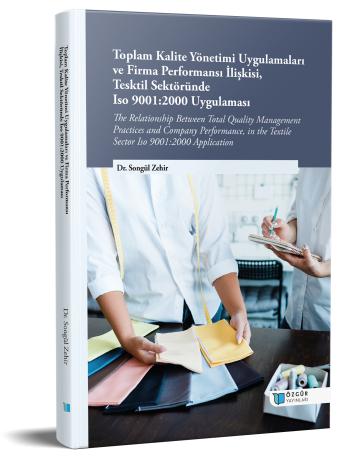
Toplam Kalite Yönetimi Uygulamaları ve Firma Performansı İlişkisi, Tekstil Sektöründe ISO 9001:2000 Uygulaması
İndir
Özet
Üretim ve hizmet endüstrisinde toplam kalite yönetimi uygulamalarının başarısı kanıtlanmıştır. Üst yönetimin bağlılığı, çalışanların katılımı, veri kaynaklı performans, anlayış değişikliği, sürekli iyileştirme, birbirine bağlı süreçler sonucunda kalite güvenliğine katkıda bulunur.
Müşteri beklentileri ve algıları arasındaki fark ürün ve hizmet kalitesi ve müşteri memnuniyeti hakkında bir fikir verebilir. Günümüzde kuruluşlar müşterilerin beklentilerini karşılamaya çalışıyorlar. Yeni gelişmeleri ve yeni yönetim dinamiklerini takip ederler. Sonrasında, yönetim değişiklikleri hizmetlere uyum sağlar. Toplam Kalite Yönetimi (TQM), müşterilerin memnuniyetini ilk ilkelerinden biri olarak kabul eden yönetim dinamiklerinden biridir. Toplam kalite yönetiminin temel amacı sadece ürün ya da hizmet değil, bir bütün olarak yönetimin kalitesini ve verimliliğini artırmaktır. Bu amacın gerçekleştirilmesi için tüm işlerin verimli ve bilimsel olması sağlanmalı, müşterinin bu günkü ve gelecekteki beklentileri belirlenmeli ve bunları istenilen zamanda ve yerde ekonomik bir şekilde karşılamak için yönetim tarzı benimsenmelidir.
Toplam kalite yönetiminin ilkeleri konusunda değişik bilim adamlarının uzun yıllardan beri ileri sürdüğü görüşler doğrultusunda Uluslararası Standart Örgütü (ISO) ISO 9000–2000 standardı versiyonunu hazırlarken 8 ana kalite uygulama prensibi olduğunu kabul ederek, standardın giriş kısmında bu ilkeleri açıklamıştır. Bu proje kapsamında ISO’nun kabul ettiği temel ilkeler açıklanmıştır. Bu ilkeler müşteri odaklı organizasyon, yönetimin liderliği, çalışanların katılımı, proses yönetimi yaklaşımı, sürekli iyileştirme yaklaşımı, tedarikçilerle karşılıklı faydaya dayanan ilişkiler, yönetime sistem yaklaşımı, verilere dayalı karar verme yaklaşımıdır. Bu proje çalışmasında İSO 9000:2000 Kalite güvence sisteminin oluşturulmasında temel alınan 8 temel kalite ilkesin ISO 9000 Kalite güvence sistemine sahip işletmelerde, Toplam kalite yönetimi uygulamaları ve firma performansı arasındaki ilişkiyi incelemektir.
Bu amaçla bir araştırma anketi hazırlanmıştır. Bu araştırmada Marmara Bölgesinde faaliyet gösteren ISO 9001: 2000 Kalite güvence sistemine sahip imalat, hizmet ve bilişim sektöründeki firmalar ana kütle olarak kabul edilmiştir. Araştırmamız İstanbul ve Kocaeli çevresinde yoğun olarak uygulanmıştır. Bu araştırma kapsamında 200 işletmeye anketlerimiz gönderilmiş olup 120 işletmeden 261 adet geçerli anket elde edilmiştir.
Ayrıca IS0 9001 Standartlına uygun örnek bir kalite sistemi kurabilmek için tekstil sektöründe standartta uygun bir kalite yönetim sistemi kurmaya yönelik rehber oluşturmaktır. Bu kapsamda örnek bir kalite el kitabı, prosedürler, talimatlar ve kalite formaları örnekleri bu kitabın kapsamında sunulmuştur.

